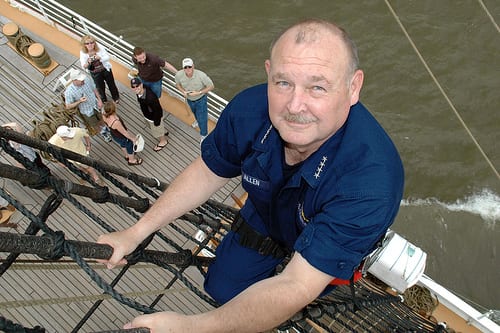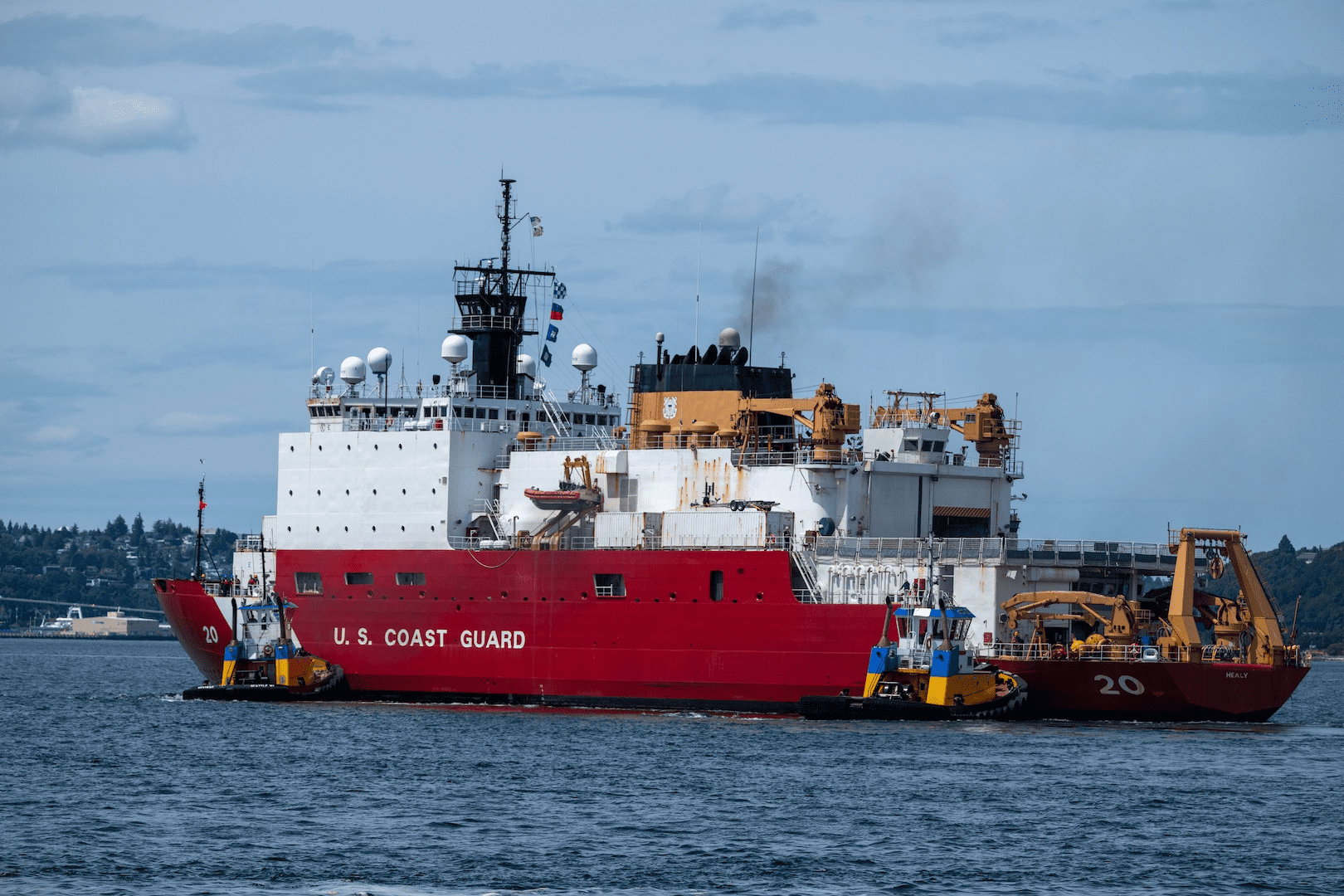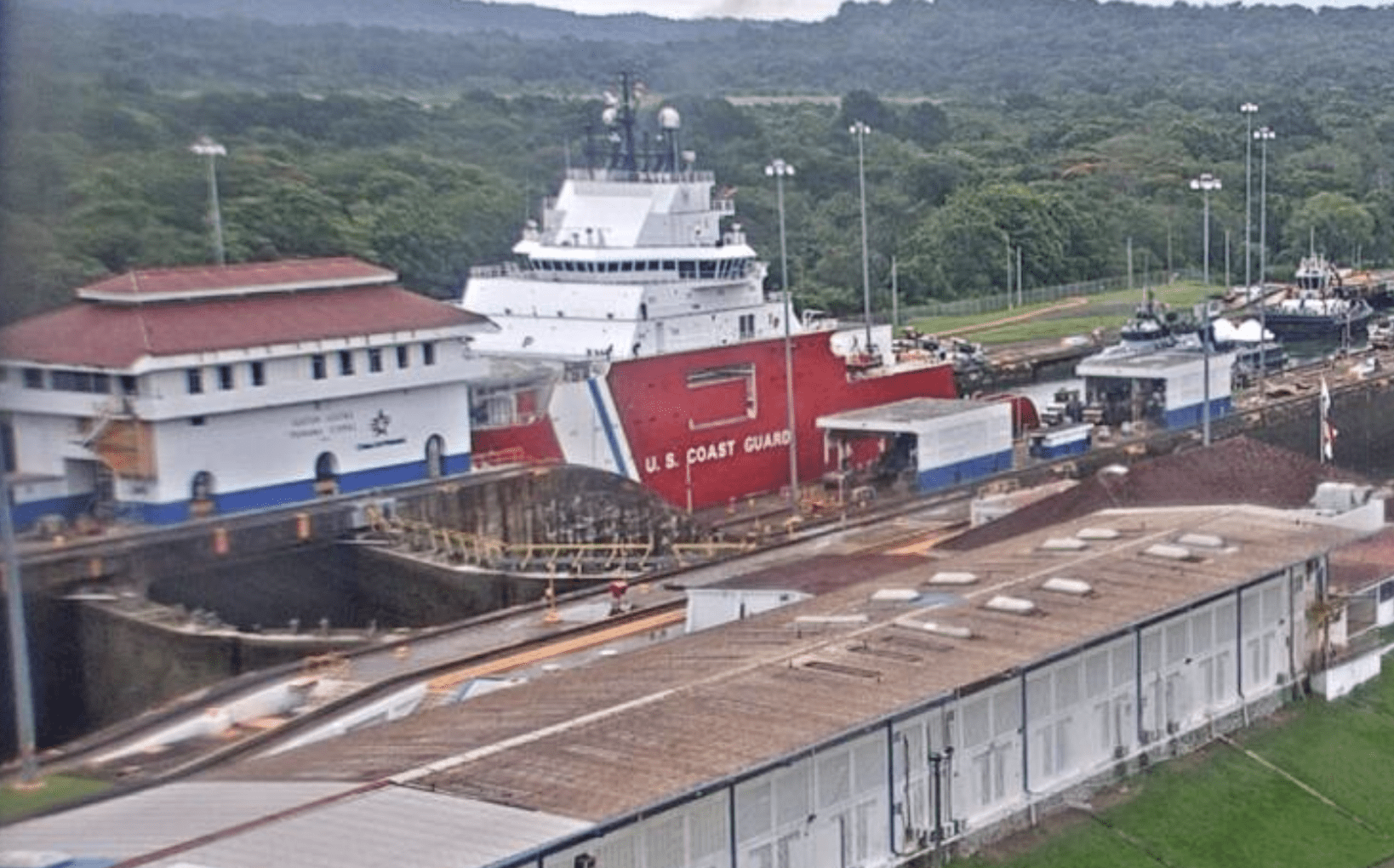
Admiral Thad Allen, USCG
Recently I had the opportunity to sit down with Admiral Thad Allen, Commandant of the United States Coast Guard. This is part two of this interview series with Admiral Allen. You can find part one via the following link: Thad Allen, Commandant USCG – A Conversation On The Digital Age Of Shipping, Part 1
gCaptain: I’d like to discuss the state of the U.S. Flag. I believe the U.S. Flag is currently facing some significant challenges; foreign involvement in the offshore industry, the Maersk Alabama attack and hijacking and the Paris MOU recently demoted the U.S. flag to their gray list.
Let’s go through each individually.
The Paris MOU uses data such as vessel detentions to rate the reputation of the flag state and they just recently demoted the U.S. flag from the white list down to the gray list. Do U.S. coast guard inspectors do inspections with Paris MOU in mind and if not, why are deficiencies not being found by U.S. Coast Guard inspectors?
Admiral Allen: I’m going to give you two answers to this. First the larger answer then put you in touch with some of our marine safety people that deal with this on a day-in-day-out basis.
First of all, at its very highest level, I think the best way to manage this problem globally is to agree upon international standards. Once we can rationalize domestic and international standards, then everybody can be using the same measure whether it’s for safety, security or something else. In this country we have a port state control matrix which takes into account performance of the flag, performance of the company, performance of the vessel itself and even the performance of the classification society involved. We weigh all that and assign a score to each arriving vessel. If the vessel fits a certain threshold we have the opportunity to dispatch a control and possibly holding the vessel offshore before bringing it into port.
I think the best way to move forward is with standardized systems that are the same all over the world but the only way to do that is for the IMO to have everybody comply with one set of standards. In fact, these are the types of initiatives that we do with the IMO.
In regards to the U.S. flag fleet, I don’t think we’ve seen any significant trends so I would have to get back to you with our inspection data compared to that of the French. One thing you need to understand, because everyone is not enforcing the same standards a ship might be on the white, gray or black list of three different countries. It can actually be the same ship operating the same way but just be classified differently under that country. This situation is not uncommon.
One of the real issues we are presently dealing with is the different view inside this country about what the standards should be for ballast water vs the international standard that has been implemented by IMO.
(Note: An update on the Ballast Water Regulations can be found on the Commandant’s blog HERE)
gCaptain: That’s a real problem indeed and the issue concerns our readers as we haven’t seen the standards decrease on U.S flagged vessels. But it is an important question for finding areas that can improved.
I wanted to ask what is the Coast Guard’s responsibility for representing and promoting the flag to the international community?
Admiral Allen: Well, our role has to do with safety and security. We are the common authority regarding regulatory regimes, making us equivalent to the FAA for the U.S. shipping community.
As far as promoting the flag, competitiveness and the associated economic issues fall under MARAD’s statutory of responsibility. But regarding promoting a standard of equality for how the global governments process shipping, we have a significant role. I lead the U.S delegation, on behalf of the state department, to the IMO. The general assembly will meet next month in London and we’ll be talking about international standards on ballast water, preventing of pollution from ships and things like that. We have a significant impact on the U.S. flag and our goal, as always, is to harmonize domestic and international standards so the U.S. fleet is on an equal playing field with the rest of the world.
gCaptain: Moving towards the offshore oil and gas industry; I understand the difficulties in dealing with the international community, but what about difficulties between US government entities. In the offshore sector specifically, how do you work with MMS and CDP to make sure you are all on the same page regarding new initiatives.
Admiral Allen: Well you bring up a good point. MMS is the leading agency for licensing and permitting activities on the continental shelf, however, we are a cooperative agency and, in licensing and permitting events, we provide input to MMS before they issue a record of decision on say, an LNG transfer facility or any other type of continental shelf development. That will be the same for onshore LNG facilities which are regulated through Federal Energy Regulator Committee (FERC).
Aside from the permitting issue we focus on the suitability of a particularly activity as it relates to safety, navigation or security. Separate from that, we have additional responsibilities to inspect rigs, platforms and offshore vessels for safety purposes. These duties are separately and independent of the licensing and permitting we are involved in.
The third place where we are starting to see real challenges is the increase in size and complexity of offshore supply vessels. These are starting to get so large that the amount of noxious liquids, fuel, water or cargo they are carrying begin to move them out of the offshore supply vessels regulatory realm and closer to that of a tanker. We have been working hard with congress to figure out how to accommodate the increased size and complexity of these vessels safely.
So, there are many areas where we integrate but offshore we deal with MMS closely on permitting issues and provide our direct input on safety and security issues.
gCaptain: Absolutely and the advancement of the largest workboats goes hand in hand with the technological advancements. This is most apparent on large exploratory vessels which contain advanced dynamic positioning and drilling systems. I imagine that many of these systems are similar to what the USCG cutter Bertholf is using.
How does the Coast Guard stay on top of regulating and inspecting new technology?
Admiral Allen: That’s a great question and if you’ve been following our marine safety program for the last couple of years then you know we are putting into place a marine safety performance improvement plan that addresses this concern. One reason for this is that we recognize some areas of technology are moving very rapidly and we have to be in the position to understand it. We must also have the competency, of our inspectors and associated rule making regime, to effectively keep pace with technology.
One of the things we have done is to create centers of expertise. Rather than moving our inspectors around or rotating military people we now bring them into a certain region, get them trained in the marine transportations system they will encounter, and then make sure we can sustain that level of competency for a particular region. For that reason we’ve created a center of expertise in our eighth district for the offshore oil industry.
So what we are trying to do is not only focus on classroom training, but actual training onboard vessels in the geographical regions in which they are operating. This is called pipeline training for our inspectors.
gCaptain: Has it been a successful program?
Admiral Allen: We are just getting geared up right now and have set up some areas of expertise which we are staffing. What we are doing is going to existing sector offices, where there is already an operating program to dealing with a specific industry segment, and adding additional people there. We then make sure training is based on the local command and it’s experience with that industry segment.
gCaptain: Moving on to some broader questions; the recent economic downturn has certainly affected gCaptain. I imagine that other organizations that support the Coast Guard and the maritime community are suffering as well. Outside of the Coast Guard budget itself how has the economic downturn affected the Coast Guard’s ability to meet objectives? Are you seeing many service providers or shipowners having difficulty providing the funds needed to maintain safety? And what is the broad view of the Coast Guard in today’s economy?
Admiral Allen: First and foremost, regarding safety, we are taking a very close look at the conditions of the ships and we see two different ends of the spectrum. For example, there might be a tendency to try and decrease costs associated with moving bulk cargos and therefore we might see a drop off in terms of the maintenance and upkeep of some of the older ships that have moved into the bulk cargo markets.
On the other hand, as I travel around the world we are finding a lot of new ships being built and a lot of companies scrapping ships rather than doing expensive maintenance and overhauls.
So I think in both realms you will see a number of new ships entering the market that have a lower cost to operate. But on the other hand we really have to watch some of these ships, especially bulk cargoes, that they are maintained adequately regardless of the increased pressure of companies on profit margins.
The other thing is that we are starting to see the effect of the financial strain on local governments. For example, in areas where we conduct joint security operations, say for the arrival of an LNG carrier, we continue to monitor the ability of local and state police to assist our efforts. For this problem we typically use a whole of government approach to identify and fill any gaps in readiness.

 Join The Club
Join The Club











